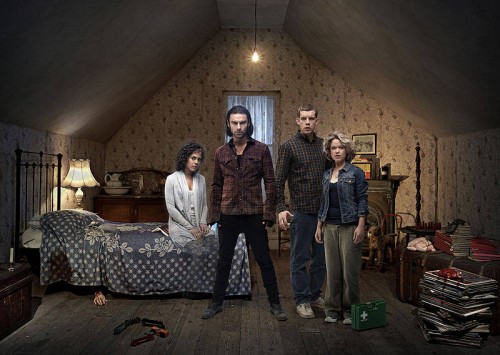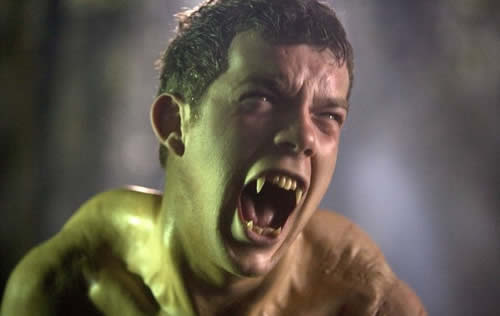
Our loving insight into the world of British pop-fantasy television continues, brought to you by our new contributor, Lynn MacDougall. Begin this video at :36.
[youtube=http://www.youtube.com/watch?v=Is2PKd3b2lQ&w=550]
Where do I belong? Where do I fit? Who are my people? Where do my loyalties lie? We all choose our tribe – it’s that need to belong, to live within boundaries; because its scary on the outside, on the fringes. You can piss your whole life away trying out who you might be … it’s when you work out who you are that you can really start to live.
What does it mean to be human? To reason, to know? To belong, be known, be loved? The “Who am I?” question of the soul has been asked since man’s thoughts have been recorded, from Aristotle to Augustine to Nietzsche to Lewis to…Whithouse.
Toby Whithouse’s Being Human tries to peer into the mind’s eye on this, too. It seems clear from myriad posts that we want to be known, belong, be loved—we make frantic attempts and fail, for the most part because the great divide lies within. The heart is rife with the battle of good-and-evil, it teems in turmoil in the depths of the soul. Human being must take this conflict into account, as even Paul said it in Romans:
For I do not understand my own actions. For I do not do what I want, but I do the very thing I hate. For I know that nothing good dwells in me, that is, in my flesh. For I have the desire to do what is right, but not the ability to carry it out. For I do not do the good I want, but the evil I do not want is what I keep on doing.
The truth of evil lying in wait is no surprise. I guess then a mammoth part of the journey is confronting and accepting the fact that there is evil inside us; only then can we confront and accept what “being human” means. Whether they know it or not, this is what the BBC show is attempting to communicate. To quote Robert Louis Stevenson again:
In each of us, two natures are at war – the good and the evil. All our lives the fight goes on between them, and one of them must conquer…
Season 1 introduces the plot: a ghost (Annie), a werewolf (George), and a vampire (Mitchell) live together. Per the opening monologue (above), the desire, the hunger to belong is primary. This is true especially for fringe folks—here, three supernatural beings. We hear this as Christians as “the already but not yet,” but don’t we all long to belong, to be loved? And It often feels elusive; we know there is something more.
Annie is not able to “move on” because she has “unfinished business” on earth; she isn’t physically seen by humans and this accentuates the consummate loneliness she lives. Likewise, the proverbial full moon transforms George into a monster once a month—during that time he is an outcast and a murderer, living in dread of doom; no one can truly know him without also knowing his darkness. Mitchell, then, is the most tortured, an addict with no hope. Together, the trio earnestly desires merely to be human—loved and known—but human is exactly what they are not.
 Season 2 portrays the “evil without”—in this instance the hunting of vampires by a couple of fundamental Christian types. The consequence, in my opinion, is a poorly done and very one-dimensional portrait of Christianity, although there are some nuggets of truth interspersed. Toby Whithouse, in an interview, claims, “This (show) is in no way a statement about religion … but if people believe in an invisible, omniscient, all-powerful being, then it’s not that big a leap of faith to believe in vampires and werewolves and ghosts.” I am reminded here of something Nietzsche said in Beyond Good and Evil:
Season 2 portrays the “evil without”—in this instance the hunting of vampires by a couple of fundamental Christian types. The consequence, in my opinion, is a poorly done and very one-dimensional portrait of Christianity, although there are some nuggets of truth interspersed. Toby Whithouse, in an interview, claims, “This (show) is in no way a statement about religion … but if people believe in an invisible, omniscient, all-powerful being, then it’s not that big a leap of faith to believe in vampires and werewolves and ghosts.” I am reminded here of something Nietzsche said in Beyond Good and Evil:
Whoever fights monsters should see to it that in the process he does not become a monster. And when you look long into an abyss, the abyss also looks into you.
The end of season 2, and all of season 3, move to the internal agony—Mitchell’s being the vehicle. He claims, “I’m an animal…I don’t deserve mercy or forgiveness. I’m a murderer…I’m a disease…I’m a plague.” Super slick vampire Richard says, “The depravity of the human heart knows no bounds…” Season 4’s Hal says, “This is what I’m saying…we can raid the dressing up box and pretend to be human…but ultimately what’s the point? Sooner or later we all go back to being the monsters we truly are.” Ouch.
Fascinating that a reprobate vampire can be my agent of confession. The reason is we know it’s there for us, too; we know we can’t fix the evil, even though we spend most of our lives trying. It’s not just masochism that makes Mitchell say, “I want you take me to all my victims, I want to feel it. I want to suffer …” and later on groans to Annie “I want to be punished!” George back-and-forths with Mitchell about debts being repaid and forgiveness. Within each character, hunter becomes the hunted, and the denouement of it all is –spoiler!—Mitchell begging George to kill him—for the sake of humanity, but also to save him from…himself.
We cannot bear what we know is inside us. To look at the truth is death. Yet we will cling to even the faintest possibility of relief, of hope offered. Paying down a debt, sacrifice, redemption. In one of George’s last ditch pleas with Mitchell he begs:
I’m going to be a father soon, I have to teach my child the right way to live, I have to teach my son or daughter about humanity, and that someone is worthy of redemption no matter what they’ve done, that someone can be forgiven their sins, no matter how unforgivable, that is the ultimate test.
George, how right you are—more right than Mr. Whithouse realizes. But the ultimate solution, of course, is way more costly, way more extreme, way more extraordinary. Annie, George, and Mitchell can never truly experience what it means to be human, as in being created in God’s image. They will never be truly known or loved as they have longed for in life and “death.” They will not experience the victory of good over evil. They will not experience the true resurrection outside of their purgatories and vague eternities. This all because they live outside the “true myth,” per C.S. Lewis:
The heart of Christianity is a myth which is also a fact. The old myth of the Dying God, without ceasing to be myth, comes down from the heaven of legend and imagination to the earth of history. It happens – at a particular date, in a particular place, followed by definable historical consequences… By becoming fact it does not cease to be myth: that is the miracle… To be truly Christian we must both assent to the historical fact and also receive the myth (fact though it has become) with the same imaginative embrace which we accord to all myths…For this is the marriage of heaven and earth: Perfect Myth and Perfect Fact: claiming not only our love and our obedience, but also our wonder and delight, addressed to the savage, the child, and the poet in each one of us no less than to the moralist, the scholar, and the philosopher.
Truthfully, we don’t really get it either—this mystery, the meaning of the true myth—do we? This is why I watch Being Human. The craving for truth and beauty gets a hit, even in the world of a ghost, a werewolf, and a vampire, I find beauty and truth because of the Perfect Myth. And I get a glimpse of what the three characters (and I) crave in Annie’s words:
My name is Annie. Two years ago I died. But that’s when my life really began—in the company of horrors I learned about friendship and loyalty, sacrifice and courage. Humanity isn’t a species. It’s a state of mind. It can’t be defeated. It moves mountains, it saves souls. We were blessed as much as we were cursed. In this little enclave of the lost, I witnessed the very best of being human. We were safe here while outside the monsters prowled.
But it isn’t humanity that moves the mountains and saves souls. That’s the divide. Mitchell, at the very end, can at least say with confidence, “Love made me human…” And we can say, with confidence, “Love became human.”
[youtube=http://www.youtube.com/watch?v=-O5kflDCWN4&w=550]

COMMENTS
Leave a Reply














